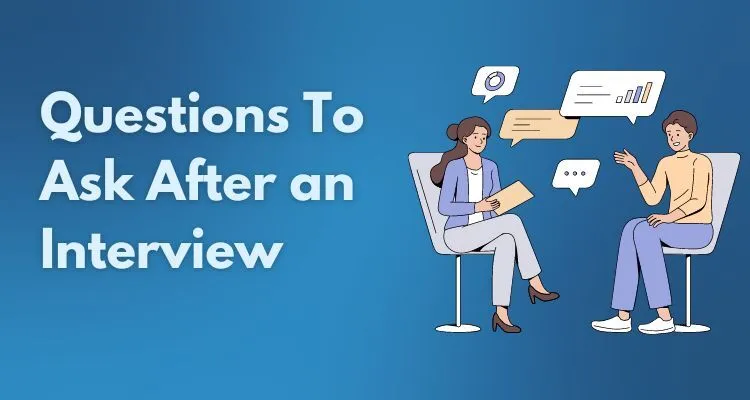- Home
- -Blog
Questions To Ask After an Interview

- 13 June 2024
- Admin
Questions To Ask After an Interview
Importance of Asking Questions After an Interview
Asking questions after an interview is essential. It shows your genuine interest in the role and the company. Engaging with the interviewer helps demonstrate that you're not just looking for any job but this specific job. This step can set you apart from other candidates.
How It Reflects on Your Interest and Engagement
When you ask thoughtful questions it shows you're proactive and have done your homework. It also allows you to see if the company is the right fit for you. This two-way exchange can help build a positive rapport with the interviewer increasing your chances of landing the job.
According to a survey by Glassdoor 77% of job seekers say that asking questions during an interview can significantly increase their chances of getting hired. A report from LinkedIn states that 92% of recruiters believe that candidates who ask insightful questions are more likely to be offered the job. These statistics highlight the critical role that asking questions can play in your job interview success.
Key Questions to Ask
Job-Specific Questions
Q. Can You Describe a Typical Day for Someone in This Role?
Understanding the daily tasks and responsibilities helps you visualize what your work life would look like. It also sets clear expectations for the role.
Q. What Are the Main Challenges This Role Faces?
This question provides insights into potential obstacles you might encounter. It shows that you are proactive and ready to tackle challenges.
Q. How Does This Position Contribute to the Company's Goals?
Knowing how your role fits into the broader company objectives can help you understand your impact. It also shows that you are interested in contributing to the company's success.
Team and Culture Questions
Q. Can You Tell Me More About the Team I Will Be Working With?
Learning about the team gives you a sense of the people you'll collaborate with daily. It helps gauge the team dynamics and compatibility.
Q. What is the Management Style of the Team?
Understanding the management style helps you see if it aligns with your working preferences. This can impact your job satisfaction and productivity.
Q. How Does the Company Support Work-Life Balance?
This question helps you understand the company's policies on work-life balance. It shows you care about maintaining a healthy work environment.Performance and Growth Questions
Q. What Are the Performance Expectations for This Role in the First 6 Months?
Knowing the short-term goals helps you align your efforts with the company's expectations and hit the ground running.
Q. Are There Opportunities for Professional Development?
This shows your interest in growth and continuous learning. It helps you understand the potential for career advancement within the company.
Q. How Often Are Performance Reviews Conducted?
Regular feedback is crucial for professional development. This question helps you know how often you'll receive evaluations and opportunities for improvement.
Q. What Are the Performance Expectations for This Role in the First 6 Months?
Knowing the short-term goals helps you align your efforts with the company's expectations and hit the ground running. This is a key area to focus on when preparing for HireVue interview questions, as it can demonstrate your readiness to meet performance metrics.Questions About the Company
Q. What Are the Company's Long-Term Goals?
Understanding the company's long-term goals helps you see the bigger picture. It shows your interest in the company's future and how you can contribute to its success.
Q. Can You Tell Me About Some of the Company's Recent Achievements?
This question gives you insights into the company's successes and priorities. It shows that you are interested in what the company values and celebrates.
Q. How Does the Company Measure Success?
Knowing how the company defines and measures success helps you understand its values and goals. It also shows that you are goal-oriented and interested in contributing to the company's achievements.Logistics and Next Steps
Q. What Are the Next Steps in the Interview Process?
Understanding the following steps helps you prepare for what's ahead. It shows that you are eager to proceed and committed to the process.
Q. When Can I Expect to Hear Back From You?
This question sets your expectations for the timeline. It helps you manage follow-up actions and reduces anxiety about waiting.
Q. Is There Anything Else You Need From Me at This Stage?
Offering to provide additional information shows you are thorough and proactive. It also ensures that the interviewer has all they need to make a decision.Questions to Avoid
Q. Avoid Asking About Salary and Benefits Too Early
Discussing money and perks too soon can give the impression that you are more interested in the compensation than the job itself. Save these questions for when an offer is on the table.
Q. Don't Ask About Vacation Time in the Initial Interview
Bringing up vacation time early on can make it seem like you are already planning to take time off. Focus on the role and responsibilities first.
Q. Avoid Questions That Show You Haven't Done Your Research
Asking questions that could be easily answered by a quick look at the company's website or recent news can make you appear unprepared. Make sure your questions reflect genuine curiosity and preparation.Conclusion
Asking questions after an interview is crucial for showing your enthusiasm and gaining valuable insights. Remember to prepare thoughtful questions tailored to the role and the company. Here are some final tips to make a lasting impression:
- Be polite and professional.
- Focus on open-ended questions.
- Listen actively and respond to the interviewer's answers.
- Avoid questions about salary or benefits too soon.
- End with a positive note expressing your continued interest in the role.
By following these tips you can leave a strong positive impression on your interviewer.



